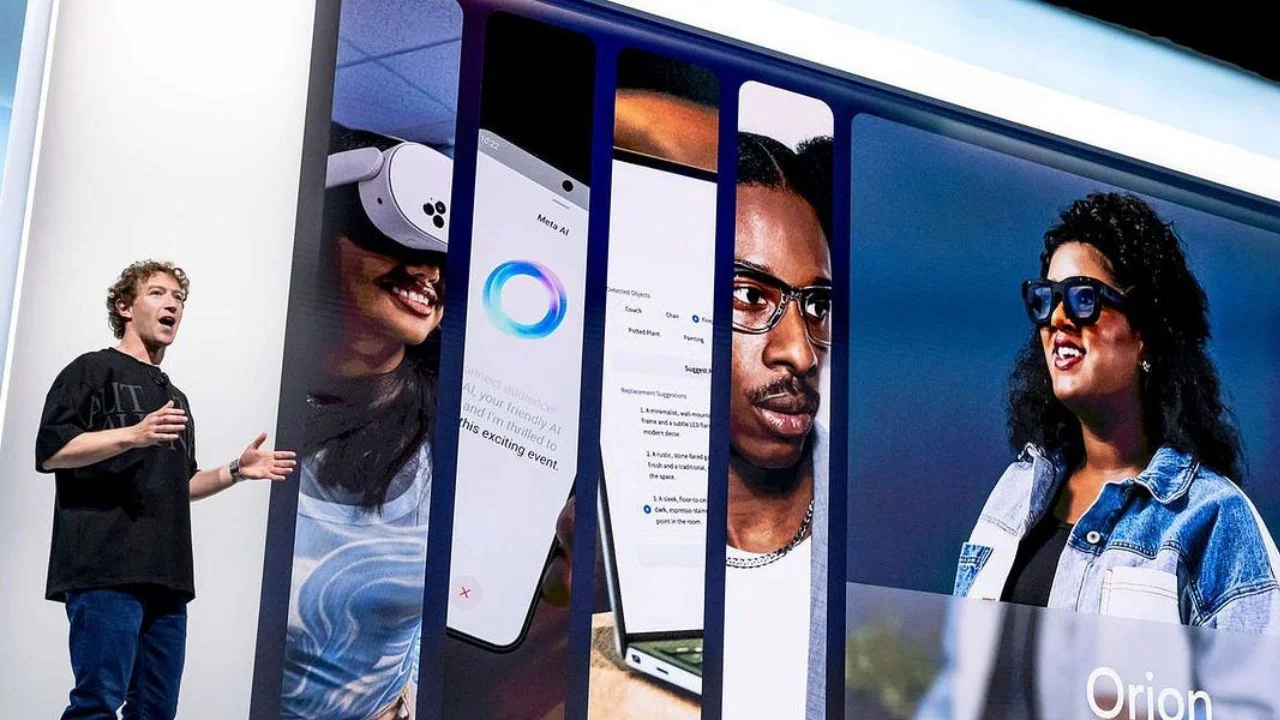
Meta has once again set the tech world ablaze with its latest groundbreaking innovation: the Orion AR glasses. Unveiled during the much-anticipated Meta Connect 2024, these augmented reality glasses promise to reshape the way we work, play, and even communicate. Meta CEO Mark Zuckerberg proudly announced that this futuristic device is the result of over a decade of development, presenting it as “the next major computing platform.”
But while the cutting-edge technology of Orion AR glasses dazzles the senses, a growing question lingers: Could this leap forward in wearable tech come at the cost of our mental clarity, privacy, and human connection?

Meta’s Orion AR glasses have been met with glowing praise from top-tier tech personalities and journalists who were given a chance to test them firsthand. Nvidia’s CEO Jensen Huang marveled at the device’s impressive eye-tracking capabilities, stunning color contrast, and wide field of view—all packed into an ultra-lightweight design weighing just 100 grams. Even artist Refik Anadol, who incorporates AI into his digital artwork, admired Orion’s wireless design and how it blends seamlessly into everyday wear.
The Orion AR glasses are equipped with groundbreaking features, including the ability to multitask like never before. From tracking nearby objects to generating information via built-in AI, the glasses offer a powerful new way to interact with our environment. Need to pull up a recipe while cooking? Check. Want to browse the web while walking? Done. This device puts the power of a computer, smartphone, and smartwatch directly in front of your eyes.
But while Orion gives us access to a world of information at the blink of an eye, it also poses deeper questions. As our vision becomes digitized, are we at risk of losing the clarity of our minds?

The Orion AR glasses introduce a new era in which screens no longer sit in our pockets or on our wrists, but instead become an extension of our vision. The technology consists of normal-looking glasses, a neural wristband, and a wireless compute puck, ushering in a future where AR devices could replace smartphones entirely by the 2030s.
Meta envisions a world where these glasses will allow us to send messages, chat with friends, play holographic games like chess or ping-pong, and engage with the digital world in ways that feel natural and immersive. Imagine holographic projections that allow 3D images to float in midair, displaying everything from Instagram posts to virtual versions of your faraway friends.
This futuristic vision sounds exciting, but it also begs the question: Will this nonstop stream of digital data overwhelm us? Will we lose touch with reality as our minds become saturated with virtual content?
With Orion AR glasses, the boundaries between the digital and physical worlds blur further. The device’s AI-driven capabilities allow it to constantly monitor and interpret its surroundings, raising important concerns about privacy. If today’s surveillance cameras track our movements in public spaces, tomorrow’s AR glasses could go a step further—monitoring even our eye movements, pulse signals, and facial expressions.
This intimate level of data collection brings up uncomfortable questions. Will our personal information remain private, or will these devices make it easier for tech companies or governments to track and manipulate us? And more importantly, how will this impact our freedom?
Beyond privacy concerns, there’s another risk: social isolation. As we become more attached to the digital world, will we lose touch with the people around us? Picture this: Instead of meaningful conversations at dinner, we may find ourselves distracted by virtual messages and projections. In a world where notifications appear directly on our retinas, could we lose the simple joy of making eye contact with loved ones?
MIT professor Sherry Turkle has warned that as we become more intimate with our devices, we risk becoming lonelier. The Orion AR glasses, designed to simulate reality, may actually deepen our sense of isolation by pulling us further into the virtual realm, away from the richness of real-world experiences.
Despite these concerns, AR technology also holds incredible potential for improving lives. By tapping into neural activity, AR glasses like Orion could unlock new possibilities for people with physical disabilities, enabling them to work, communicate, and interact in ways previously unimaginable. The ability to project information directly into a user’s field of vision has the power to revolutionize industries like healthcare and education.
For instance, in low-resource areas, AR glasses could be used to deliver expert knowledge in real-time. A study by Stanford University’s Wu Tsai Neurosciences Institute demonstrated how AR was used to remotely guide medical students in Kenya through complex procedures. This shows how AR, combined with AI, can bridge gaps in knowledge and infrastructure, allowing users to complete intricate tasks without needing direct supervision.
But there’s a flip side. Without deliberate efforts to ensure AR is accessible to all, the technology risks becoming a luxury item, further dividing the haves and have-nots. Will AR tech widen the digital divide, or will it become a tool for global equity?
As with all new technology, AR glasses come with environmental concerns. The chips embedded within the Orion AR glasses are energy-intensive, requiring significant resources to produce. The mining of minerals for these chips also raises questions about their ecological impact. As wearable technology becomes more integrated into our lives, we must also grapple with its environmental footprint.
The increasing integration of technology with the human body brings us closer to what some experts have described as a “cyborg” future. According to Donna Haraway, a professor of history of consciousness, our growing reliance on wearable tech may blur the line between human and machine.
Meta’s ambitious vision, reflected in its recent $4.5 billion operating loss, underscores Zuckerberg’s determination to bring this vision to life. Yet the financial challenges faced by Meta’s Reality Labs division raise important questions. Can these revolutionary devices succeed in the marketplace, or will they remain a futuristic dream?
Meta’s Orion AR glasses could fundamentally change how we interact with the world around us. They promise convenience, productivity, and new opportunities for personal and professional growth. But they also force us to confront the deeper implications of such technology.
Will these glasses sharpen our understanding of reality, or will they obscure what it truly means to live, love, and think in the real world? Only time will tell.
Subscribe and get 3 of our most templates and see the difference they make in your productivity.
Includes: Task Manager, Goal Tracker & AI Prompt Starter Pack
We respect your privacy. No spam, unsubscribe anytime.